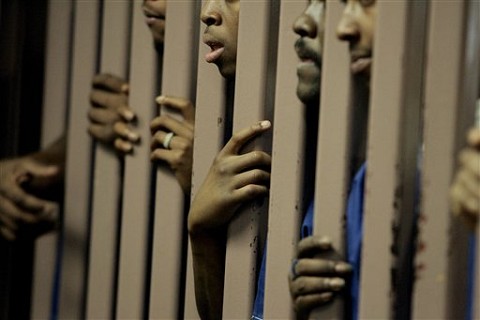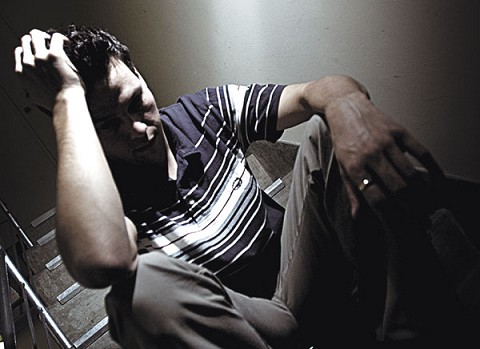I knew something was wrong as soon as I walked in. Kikim was nowhere to be found. I called out for him and the other boys pointed behind a curtain.
He walked out of the jail cell’s makeshift bathroom with a troubled look on his face. Something was definitely wrong.
He sat down and told me he didn’t want to study. Because the communication and language barrier is an issue I almost always have to ask him to explain what he’s saying.
“You don’t want to study? We can do it tomorrow if you want,” I said.
He shook his head so I repeated, “You don’t want to?”
Agitated, he finally sighed and said, “No, let’s study.”
I knew that this was going to be a different lesson, not the usual question and answer session. So I asked him if I could pray for him before we even started.
I asked that the language barrier not be an issue at all. Today wasn’t a day for struggling through trying to figure out what the other is saying. I could tell. So I opened up my bible to what I’d read that morning and asked him to read it in Visayan first:
So I opened up my bible to what I’d read that morning and asked him to read it in Visayan first:
“Praise be to the God and Father of our Lord Jesus Christ, the Father of compassion and the God of all comfort, who comforts us in all our troubles, so that we can comfort those in any trouble with the comfort we ourselves have received from God.
For just as the sufferings of Christ flow over into our lives, so also through Christ our comfort overflows. If we are distressed, it is for your comfort and salvation; if we are comforted, it is for your comfort, which produces in you patient endurance of the same sufferings we suffer.
And our hope for you is firm, because we know that just as you share in our sufferings, so also you share in our comfort.”
It was supposed to be a quick English lesson. He was supposed to read it in English and we’d figure out the rest. Which words did he understand? Which words were difficult?
But as soon as he read it he looked away, wiping his eyes.
One of our translators was right beside me. Usually they’re busy with the other inmates, but she was exactly where she needed to be. I told her, “Ask him what’s wrong. Tell him to tell me what’s going on.”
He started telling me about his angst. How he thought he was going to be released that day, but the judge wasn’t around. How he turns 18 on Thursday and that he’s worried. When you’re a minor the courts are lenient. Once you’re 18 years old the punishment is harsh. He’d been waiting two years for this day and now time is running out. He’s angry.
I ask him questions:
“Where’s your family?”
“They don’t care about me. I don’t know.”
“Are you afraid?”
He looked away.
And finally, “What do you want to do when you get out?”
He says he wants revenge. He wants to kill those who have done him wrong.
“I have no conscience,” he tells our translator in Visayan. He looks at me, points to his chest, and says in English, “My heart. It’s stone.”
I stumbled through what I said next, knowing he needs someone to listen. He needs someone to love despite the things he’s saying. I know this because if he didn’t need this, God wouldn’t have sent me to him. He wouldn’t have led me to that verse this morning. And he wouldn’t have told me to share my story with him.
I continued to tell him that I had no idea what he felt like. I’ve never been imprisoned. I’ve never been in his situation. I’ve never wanted to kill anyone else, but I have been at the point where I thought nobody cared, when nothing anyone said about God could convince me to turn to him.
never wanted to kill anyone else, but I have been at the point where I thought nobody cared, when nothing anyone said about God could convince me to turn to him.
I told him the usual parts of my story that I tell, but unlike the other times I’ve told it, something was telling me that the detail I usually leave out needed to be told.
“When I thought God wasn’t around, when I felt the pain hurt so much inside that I didn’t know what to do,” I gulped and pointed to my left arm. “I would get scissors and cut myself.”
Although he’d been looking down the entire time, he instantly looked up into my eyes and he said, “Like this?” He turned his left arm around and several large scars stared back at me. I looked at him, wide eyed, and quietly said yes.
Despite this incredible discovery, he told me, through the translator, that nothing would affect him. That he’d heard people’s stories before and they’d had no affect on him. That inside he was bitter, angry, full of rage.
But I know that something huge is happening in his life. I continued to try to talk to him, telling him, “What are the chances that the teacher you’d get would have done the same thing you did? I know I’m not in jail, I know I don’t know what it feels like to be on the other side of these bars, but God wanted you to know that he sees you, he loves you.”
Until that moment I had no idea why I was the one who had ended up teaching him. He wanted to learn the bible. There are plenty of people on the race who know so much more than I do, but they weren’t there.
God wanted to use what had always been my secret shame for him because just as he comforted me, he wants to comfort Kikim.
I’m praying that Kikim will let him. And that his heart, which he says is made of stone, will one day be one that beats for the God who loves so much that he sent a girl from Texas all the way to Cell No. 6 in Malaybalay, Philippines just for him.








